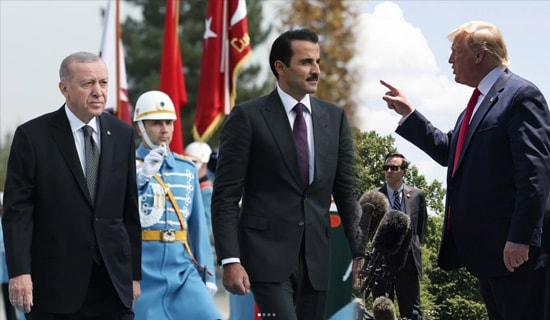In a June 4, 2011 article, Mustafa Al-Sawwaf, a columnist for the Hamas-affiliated daily Falastin, claimed that the only thing Israel and Hamas could negotiate was the departure of the "Israeli Jews" from all of Palestine and the reestablishment of Israel elsewhere.
In another article, published two days later, Al-Sawwaf wrote that the events of this year's "Nakba Day" (May 15, 2011) and "Naksa Day" (June 5, 2011), as well as the revolutions in the Arab world, marked 2011 as the dawn of a new chapter in history. This chapter, he predicted, will end approximately 15 years from now, with the liberation of Palestine and the end of the Zionist occupation. He added the Palestinians must reject any peace initiative that divides Palestine into two states, and must patiently wait for the end of the occupation and the restoration of Palestine to its rightful owners. He emphasized that the struggle against Israel was a religious one, and would only be decided once this was understood.
Following are excerpts from both articles:
We Do Not Believe in Negotiations for Dividing Palestine
In his June 4, 2011 article, Al-Sawwaf wrote: "Do not be surprised if, one day, you hear that Hamas, as the representative of the Palestinian people, is holding direct negotiations with the Israeli occupation.
"It is not important where such negotiations are held or who conducts them. What is important is the aim of these negotiations.
"[Let me emphasize that] this does not mean that any negotiations, direct or secret, are [currently] underway between Hamas and 'Israel'... [But] Hamas does not discount [the possibility of] negotiations with 'Israel.' Rather, [some negotiations] are forbidden because of their aim. There are those who have negotiated with 'Israel,' and continue to dream of negotiating, with a mind to dividing Palestine between the Palestinians – who are the [rightful] owners of the land and of [its] history and geography – and the usurping occupation that wants to take their place.
"Hamas's negotiations with 'Israel' – if there were to be [such negotiations] – would be different, for example, from those [conducted by Palestinian Authority President Mahmoud] 'Abbas, who, in response to the French initiative [for a peace conference in Paris], said that his first choice was negotiations, his second choice was negotiations, and his third choice was negotiations. He has yet to learn that this is an unfortunate choice, as these negotiations are based on principles which are unacceptable to the Palestinian people. The negotiations which he conducted failed utterly – yet despite this, he continues to cling to them and to strive for [further negotiations].
"As for the sort of direct negotiations that could be held between Hamas and 'Israel,' we do not believe in negotiating for the sake of recognizing Israel or for the sake of land swaps with it. Nor [do we believe in negotiating] for the sake of relinquishing rights and steadfast principles [in exchange] for recognition of the Palestinian state or approval of a [Palestinian] appeal to the U.N., or for the sake of dividing Palestine.
"Hamas could only negotiate with 'Israel' over one thing: the departure of the occupation from Palestine and arrangements for the safe removal of 'Israel' [from Palestine] – meaning from all of Palestine and not [just] the 1967 [territories], or any of those fairytales and nonsensical [notions] that are heard from time to time amongst the Palestinian and Israeli negotiators or the American, European, and Arab delegates...
"These are the [only] negotiations that Hamas does not reject. The Palestinian people does not consider them a disgrace. If 'Israel' agrees to the notion of departing from Palestine and wants someone with whom to discuss [the arrangement of] such a departure, we believe that Hamas would comply and would be best suited for this role, since it does not back down from its positions and assurances, and is as steadfast as a mountain. [In fact,] if 'Israel' does not turn to Hamas of its own volition and request such negotiations, [Hamas] will do this unwillingly.
"Time will prove us right. Therefore, do not waste time [on negotiations instead of] devising and formulating plans for [the Jews'] departure from Palestine – a safe departure that will ensure human dignity, following which the Israeli Jews will go wherever they wish and establish a country there. If they [establish] a country that does not come at the expense of any other peoples – as in the case of the Palestinian people – then Hamas will recognize 'Israel.'"[1]
2011 – The Beginning of the End of the Zionist Occupation
In his June 6, 2011 article, published the day following "Naksa Day," Al-Sawwaf wrote: "We have turned the page on the Naksa for good, and also on the Nakba. Just as on May 15, [2011] we turned the page on the Nakba, and turned over the new leaf of return [to Palestine], yesterday we turned [the page on] the Naksa, and turned over the new leaf of nobility, honor, and holding our heads high... We have launched a new phase, one entailing different tools and goals.
"What happened today [i.e. on Naksa Day], which was a reenactment of the events of May 15, [2011], is a keen and emphatic message to those wishing to put down roots in the soil of Palestine – [namely a message] that the Palestinian people broke the barrier of fear long ago, and that today it has strengthened its stance.
"The [other] Arab peoples have broken the barrier of fear, as well. The spring of Arab revolutions will not stop at the borders of the countries where these revolutions raged. The reason for these winds [of change] – Palestine and the Israeli occupation – remains. If this were not the case, we would not be witnessing the [marches] on the borders of occupied Palestine aimed at supporting the Palestinian people and taking part in the realization of its goals.
"The Israeli occupation is in a state of anxiety and unprecedented alert on [its] borders... even though there are still some [Arab] regimes which continue to defend this occupier. The peoples [in these countries] are warning these regimes, saying: If you continue [along this path], you will not escape the winds of change that will storm you and harm you.
"The occupier understood this message even before the regimes [themselves] did – which is why it began fearing for its future. And indeed, several studies indicate that an increasing number of settlers in this entity [i.e. Israelis] are requesting foreign passports... in anticipation of the [approaching] moment of truth, for which they must prepare themselves.
"The events on the ground, both in Palestine and in the Arab [world] around it, indicate that 2011 is different from other years. This year is laying the groundwork for what is [to follow]. This year is laying the first brick toward ending the occupation in Palestine. This year has launched the stage of liberation and the end of the usurpation of Palestine. The occupation will end altogether in no more than 15 years. This is not a long time, but it requires patience and steadfastness alongside continuous work, sacrifice, and a non-dependence on [outside] assurances.
"This brings us back to the [issue] of apprehensions, and to the warning that has been heard from many quarters against turning the struggle with the Zionist entity into a religious one. Those who have warned against this transformation understand that it will [inevitably] come, and that it will decide the battle. They are trying to delay the historic moment when the occupation [finally] ends and Palestine is liberated – for, in the past, Palestine was liberated from its occupiers due solely to an Islamic and religious approach.
"Those who now propose [various] solutions, conferences, and peace plans [aimed at] dividing Palestine into a Jewish state and a Palestinian [state], in order to evade the impending truth, are trying to grant legitimacy to those who lack legitimacy. These plans will not succeed as long as we cling to our rights and to our belief that the occupation is temporary and that [its end is] only a matter of time. This must be understood by those who are breathlessly [chasing after] conferences of false peace, which will never come to fruition because it is a counterfeit peace.
"True peace means the restoration of rights to those [who are entitled to them], and the restoration of Palestine to its rightful owners – which is why those who are breathlessly [running to] to the Paris conference must think [twice] and stop chasing illusions. They must wait a bit and not rush. They must stand up to watch the end of the occupation."[2]
Endnotes:




.jpg)